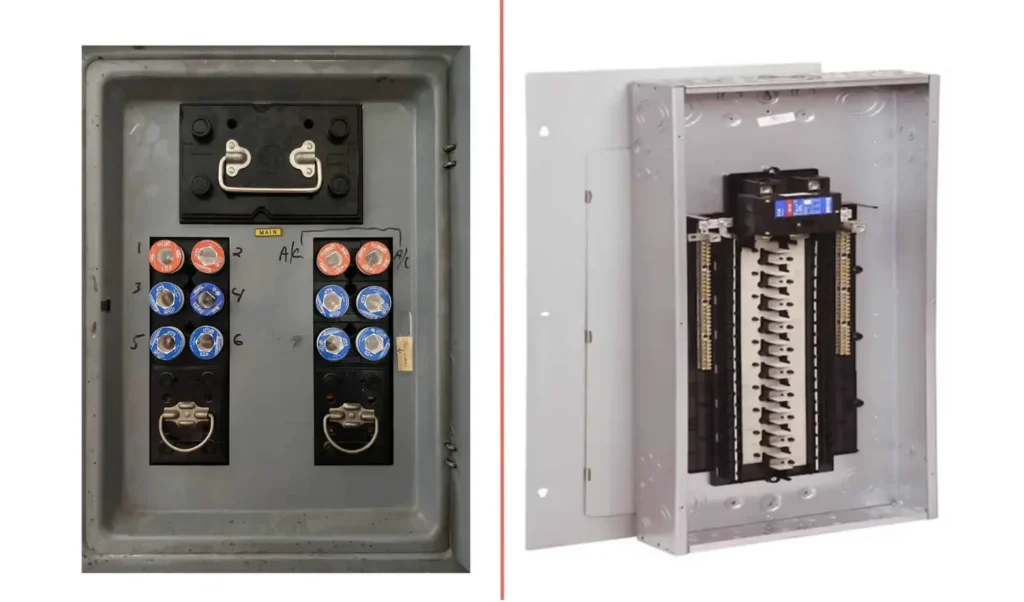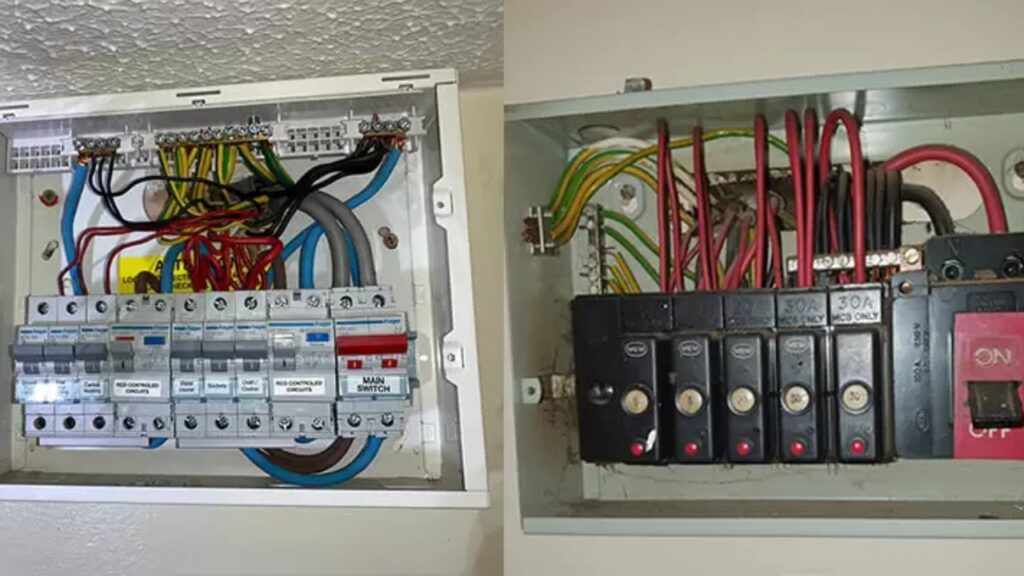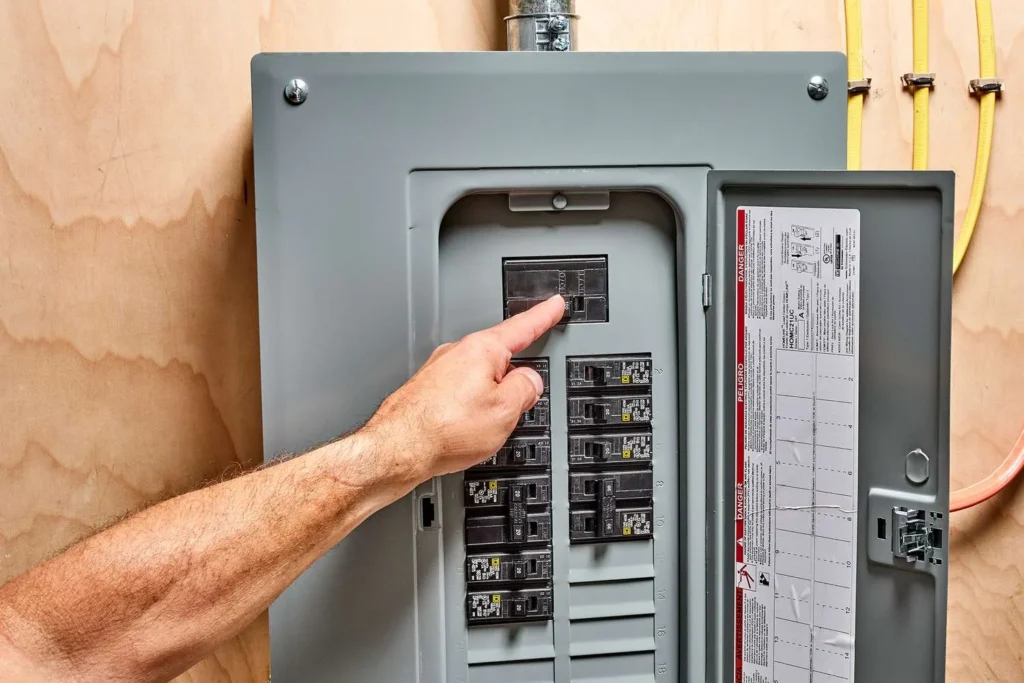Safety and efficiency should always be your main concerns with your home’s electrical system. If you’ve faced a tripped fuse or breaker resulting in an outage, you may have wondered what makes each device unique. Protecting your home’s circuits is the main function of both, but they do so in different ways and each has different pluses and minuses. Being aware of these differences may encourage you to change your home’s electrical panel for a safer and modern alternative. This blog highlights fuse boxes vs circuit breaker panels, and which you should choose, considering when an update would benefit you.
Understanding Fuse Box & Circuit Breaker Panel

What is a Fuse Box?
Many decades ago, homes began using fuse boxes to keep electrical systems safe. Basically, it is a metal box full of fuses, each one protecting a specific circuit in your home. A fuse is made up of a weak metal wire that serves to prevent damage to your electrical items.
How Fuse Boxes Work
The basic principle for fuse boxes is easy to understand. A fuse is assigned a current rating. When electrical current goes beyond the fuse rating, the wire inside heats and melts. This causes the fuse to stop working. This event is referred to as blowing the fuse. Circuit breaker trips prevent electricity from flowing. This protects your house’s electrical system and appliances, and most importantly, reduces the chances of an electrical fire. To use the circuit again, you must put in a fuse with the same rating as the one that blew. You need to do the replacement yourself, using your extra fuses. This may be difficult or confusing for those not used to electrical work in their homes.
What Is a Circuit Breaker Panel?
A circuit breaker panel is referred to as a breaker box or breaker panel. It is now the standard in both new homes and commercial buildings, having replaced fuse boxes. Instead of fuses, today’s panels have multiple circuit breakers. These allow you to reset them without having to replace damaged fuses.
How Breakers Work
Circuit breakers sense when a circuit is carrying higher than normal current, much like fuses. Unlike with melting wires, breakers turn off the electricity automatically through a mechanical switch. The action causes the circuit to be interrupted and stops overload or damage from occurring. Unlike fuses, some breakers can be quickly reset by flipping a switch, simply because they have not melted. With this important feature, everyone in the household can quickly get the power back on if there’s a short surge or a moment when the electric load is too high.
Key Differences Between Fuse Boxes and Circuit Breaker Panels

Understanding how fuse boxes are different from circuit breaker panels helps you decide which is better for you.
Reset vs Replace (Convenience)
One thing that stands out is how you deal with an electrical fault by restoring the power supply. If a fuse goes bad in your fuse box, get it out, put in a new one with the same specifications and check that it’s seated correctly. It can be annoying if you can’t find extra fuses or know which kind of replacement you need.
On the upside, circuit breakers just turn off and can be restarted by a simple switch flip. Being able to reset the device directly is both faster and far more convenient than other options. Because there are no replacements to worry about, things remain smooth and it’s easier to resolve issues when they arise.
Cost of Maintenance & Repairs
While fuse boxes may cost less to install, they usually end up costing more in the long run for their repairs. Blown fuses must be replaced again and again and the fuse boxes often need more maintenance or repairs, mainly when the system has become old or the fuses frequently blow.
Although buying a circuit breaker panel is more costly at first, it usually means saving money on repairs later. They are constructed stronger, so they rarely require repairs over time. You can also save both your time and your budget, thanks to their resettable breakers.
Electrical Capacity & Code Compliance
There has been a large increase in electrical demand at home because of new appliances, electronics and HVAC systems. Because today’s homes can handle more electricity, circuit breaker panels are built to handle those higher loads.
Building codes in different places now require circuit breakers because they comply with current safety and capacity rules. Since fuse boxes often do not follow today’s regulations, any updates or additions to old houses might not be possible if your outdated fuse box is used.
Safety Considerations
Many people focus on how safe fuse boxes are in relation to breaker panels. Circuit breakers now have advanced protection such as GFCIs and AFCIs which keep you safe from electric shocks and less likely to experience fire caused by electrical arcs. Modern safety features are not found in fuse boxes. A fuse guards against overloads, but it offers no protection against a ground fault or an arc. Being an older kind of wiring, fuse boxes can lose their reliability over the years, also increasing the possibility of electrical risks if they’re not looked after.
Should You Upgrade from a Fuse Box to a Breaker Panel?

With a fuse box, some homeowners wonder whether it’s better to replace it with a circuit breaker panel. Let’s take a look at some important points:
Signs It’s Time to Upgrade
Electrical problems in your home often reveal themselves by having blown fuses, lights that flicker or circuits that seem to lose power frequently. Rust, corrosion, or burn marks in the fuse box indicate an even greater danger.
If you want to bring more electrical devices, an office, or HVAC systems into your home, the existing wiring system may not be sufficient, so an upgrade should be considered. Buzzing sounds near the fuse box or the presence of warm spots around it are warning signs that require immediate attention from a licensed electrician.
Insurance & Real Estate Implications
Many insurance firms believe that fuse boxes are older and more risky than circuits. Some firms may decide to charge you more or refuse to cover your home due to the fire risks fuse boxes bring.
Modern circuit breaker panels can increase how much your home is worth and how easy it is to sell. Buyers often like homes with new electrical systems, as they think they are safer and more helpful.
Cost to Upgrade Fuse Box to Breaker Panel
You should be ready to pay between $1,500 and $3,000 for your fuse box to become a circuit breaker panel. It depends on your home’s size, how complex the current wiring is and what you pay in your area for electricians. The price may look expensive, but it’s helpful to remember the benefits: better safety, cheaper insurance, code-compliant work and a sense of security. Upgrading your home will help it appeal to potential buyers in the future.
Conclusion
Therefore, even though fuse boxes have been dependable, circuit breaker panels now offer better convenience, greater safety, more electricity and comply with the latest rules. Being able to reset breakers, using advanced safety systems and meeting building codes are reasons circuit breaker panels are better suited to today’s homes. Modernizing your fuse box can help keep your home, family and things you own safe. If you want proper advice and safe electrical updates, reach out to Exclusive Electric Services. Safety and efficiency are guaranteed in your electrical system with our licensed team conducting inspections and doing needed upgrades and repairs. Get in touch with us now for a consultation and check that your home’s electrical system is safe and reliable.
FAQs
Taking care of electrical panel upgrades means asking a professional to handle the work.
Yes, recent updates on breakers add GFCIs and AFCIs, making them more secure against shocks and blazes.
Your electrical panel should be inspected every 3 to 5 years or following every major electrical change.




